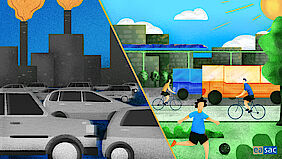Publications
European Science Academies at COP26: Curbing Motorised Transport is an Option that Urgently Must Be Put on the Table
The transport sector is responsible for nearly a quarter of the EU’s carbon dioxide emissions, and its emissions are rising faster than in any other sector. In a recent report, EASAC shows that current EU policies are unlikely to deliver emission reductions quickly enough to limit global warming to less than 2°C.
“European policies in the transport sector focus on promoting low-carbon fuels or electric cars. But these efforts are counteracted by the ever-growing popularity of heavier cars with more powerful motors. This trend is offsetting all fuel-efficiency improvements and the effect of an increased share of electric vehicles,” explains William Gillett, EASAC’s Energy Programme Director. “In 2020 sales of fuel-hungry SUVs grew to a whopping 42% of the global car market [1]. Even equipping these with electric powertrains would not solve the problem: The production of bigger cars has a much heavier impact on resources, and they require significantly more battery power. We have to go for a much broader set of regulations and incentives.”
In a joint event at the European Commission’s digital pavilion during COP26, European scientists and researchers, together with technology developers and industry pioneers, will present and discuss challenges as well as policies and regulations that could help close the gap between targets and actual transport emission trends.
The European science academies will address the potential for reducing GHG emissions by avoiding road transport, shifting passengers and freight onto more sustainable means of transport, and improving the emissions performance of road vehicles. The Potsdam Institute and ACEA will report on progress being achieved with the decarbonisation of road freight vehicles, and PeddleSmart will talk about the potential for using innovative vehicles to decarbonise the carrying of passengers and freight over the last mile.
[1] IEA 2021, www.iea.org/commentaries/carbon-emissions-fell-across-all-sectors-in-2020-except-for-one-suvs
Event Details:
12 November 2021, 13h-14h GMT, online
Registration: https://www.cop26eusideevents.eu/
Contacts:
Dr William Gillett
EASAC Energy Programme Director
Email : William.Gillett@easac.eu
Telephone +44 7879 635 740
For general enquiries
Ms Sabine Froning
EASAC Communications Officer/Communication Works
Email: sabine.froning@easac.eu
Telephone: +49 15208727000
About the European Academies’ Science Advisory Council (EASAC)
EASAC is formed by the national science academies of the EU Member States, Norway, Switzerland and United Kingdom, to collaborate in giving advice to European policymakers. EASAC provides a means for the collective voice of European science to be heard. Through EASAC, the academies work together to provide independent, expert, evidence-based advice about the scientific aspects of European policies to those who make or influence policy within the European institutions.






























